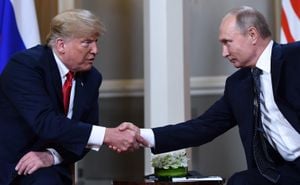India's Got Latent, the online comedy show hosted by Samay Raina, is facing major controversy after Ranveer Allahbadia made highly inappropriate remarks during its latest episode. The comments, particularly one involving crude sexual humor posed to contestants, sparked outrage across social media platforms and resulted in legal ramifications.
Following the backlash from viewers, Samay Raina took to his social media to express his frustration over the incident and announced the removal of all episodes of India’s Got Latent from his YouTube channel. "Everything happening has been too much for me to handle. I have removed all India’s Got Latent videos from my channel. My only objective was to make people laugh and have a good time. I will fully cooperate with all agencies to conclude their inquiries fairly. Thank you," Raina stated.
The controversy erupted when Allahbadia, who is popular for his podcast BeerBiceps, posed the highly inappropriate question, "Would you rather watch your parents have sex for the rest of your life or join in once and stop it forever?" This remark was met with immediate backlash, as it was deemed vulgar and unacceptable.
Reports indicate this incident led to formal complaints filed with the Mumbai Commissioner and the Maharashtra Women's Commission against Allahbadia, Raina, among others involved with the show. The complaints were based on accusations of abusive language and obscene remarks aimed at women for publicity and financial gain.
Now-building scrutiny, law enforcement has stepped up, with the Maharashtra Cyber Department recording statements from around 40 participants linked to the show. The department has started examining all 18 episodes of India's Got Latent, seeking to identify and act against those involved with unsuitable language. An FIR has been lodged under the Information Technology Act.
Allahbadia issued a public apology shortly after the controversy gained traction, admitting, "My comment wasn’t just inappropriate. It wasn’t even funny. Comedy is not my forte. I am just here to say sorry." Despite this gesture, calls for accountability from the public remain fervent.
Public feedback has been overwhelmingly negative, reflecting dissatisfaction with the nature of humor presented on India’s Got Latent. Critics have taken to social media, with some pointing out the lack of true remorse from Raina and questioning, "Where’s the apology?" Others expressed disdain for the types of jokes portrayed on the show.
Soon after the incident, multiple influencers including Apoorva Mukhija and Ashish Chanchlani, participants involved, informed the police officers during their questioning about the spontaneity of the show's format, asserting it was unscripted. They added, “We are encouraged to speak naturally during the show.” Concerns escalated even amid their defense, as they also mentioned the financial dynamics of the contestant participation requiring ticket purchase, with proceeds awarded to the winners.
The outrage has extended beyond just viewers and legal entities; public figures from various sectors have shared their responses. Some defended the creative freedom of the show, whereas others, including notable celebrities and politicians, have condemned the nature of the humor being propagated.
Samay Raina, currently abroad for comedy routines, is feeling the strain from the scandal's aftermath; his legal team has requested extensions for his police appearance, which were denied. Authorities are expecting compliance and statements from all involved as investigations continue.
Adding yet another layer to the uproar, Maharashtra’s Chief Minister expressed severe discontent over the remarks, stating such speeches violate the principles of decency and freedom of expression, which should not encroach upon the sensibilities of others.
Raina's decision to delete the content echoes broader trends around accountability and the repercussions of online comedy, forcing several influencers and public figures to reconsider the boundaries of humor and the message they portray. Critics have underscored the responsibility those with platforms carry and the potential fallout when such lines are crossed.
Even amid such upheaval, there have also been displays of support, with other creators stepping up for Raina, voicing concerns over the nature of the outrage directed at him and the invasive scrutiny it entails. They advocate for the value of laughter amid controversy and seek to differentiate between accountability and mob justice.
Going forward, how this situation will evolve remains uncertain as authorities probe the nuances of the case and the broader discourse on comedy and its societal impacts continues. The case brings to light significant conversations around ethics within online content creation, the limits of freedom of speech, and the accountability of influencers.



